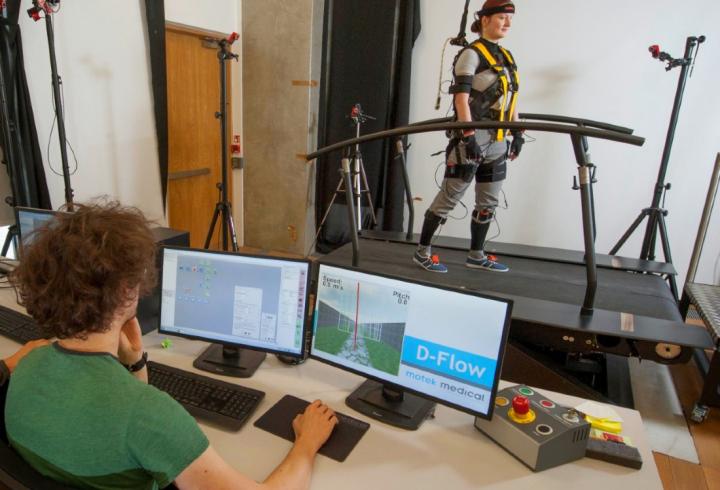Functional Rehabilitation
We design assistive robotic systems and games to restore movement.

Wearable robots, functional electrical stimulation and serious games are three of the most advanced technologies that are currently used in the rehabilitation of people with neuromotor conditions. Our ultimate goal is to reduce the users' reliance on supportive devices, where possible, and to enhance outcome measures, in general.
Wearable robotics
It has been shown that rehabilitation robotics improves the user's movement and offer health benefits associated with the user's posture and/or improved blood circulation.
We develop behavioural and optimisation-based techniques to improve the control and design of these technologies. Working with musculoskeletal models to simulate the dynamic interface between robot and user, we aim to develop quantitative methods to measure the therapeutic outcomes of the therapy. For more information, please visit the website of the Statistical Learning and Motor Control group.
Statistical Learning and Motor Control group
Active Projects
We research lower limb exoskeleton control and gait analysis. Exploiting our world-leading gait lab facilities (split treadmill, force plates, Vicon motion tracking, EMG sensing, interactive visual feedback, calorimetry, FES), we have experimented with several novel ankle, pelvis and whole lower limb exoskeleton and prosthetic devices including design and evaluations.
-
Effectively quantifying the performance of lower-limb exoskeletons over a range of walking conditions, Frontiers in Robotics and AI, 5:61-77, 2018 PDF Video
-
Bio-inspired design and validation of the Efficient Lockable Spring Ankle (ELSA) prosthesis, Proc. 16th IEEE Intl. Conf. on Rehabilitation Robotics(ICORR), 2019. PDF Video
-
A Novel Approach for Representing and Generalising Periodic Gaits, Robotica, 32(08):1225-1244, 2014.
We model the multi-modal processing and adaptation in human sensorimotor control using techniques from Bayesian inference. The notion of priors, adaptation and temporal processing from a perspective of optimality is explored through novel experimental design and modelling.
Serious Games
Serious games have been investigated for their use in multiple forms of rehabilitation for decades. The rising trend to use games for physical fitness in more recent years has also provided more options for and garnered more interest for their use in physical rehabilitation and motor learning. Most of the rehabilitation games are designed to be engaging so that the users can repeat many thousands of trials in several rehabilitation sessions, at home or the clinic.
Active Projects
Our working hypothesis for games that are designed for neuroprosthetics is that, beyond being engaging, the skills acquired in playing the game should transfer to and enhance the control of the device. Only then, the long-term effect of serious games in neuroprosthetics can be proved.
Collaborators
| Dr Matthew Dyson | Newcastle University |
Harmony: Enhancing Healthcare with Assistive Robotic Mobile Manipulation
EU H2020 (2021-2024)
Enhancing Motivation and Engagement in Game-based Rehabilitation
Leverhulme Trust (2019-2022)
Serious games are not serious enough for myoelectric prosthetics
JMIR Serious Games 2021
Perception of game-based rehabilitation in upper-limb prosthetic training: a survey of users and researchers
JMIR Serious Games 2021
Effectively quantifying the performance of lower-limb exoskeletons over a range of walking conditions
Frontiers in Robotics and AI 5:61-77, 2018
Gait Lab
Research at Edinburgh Neuroprosthetic laboratory benefits from a fully-instrumented Gait Laboratory. For more information, please visit the website of the Statistical Learning and Motor Control group.
